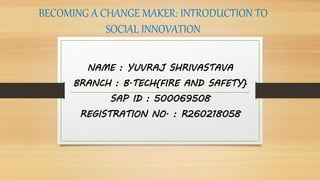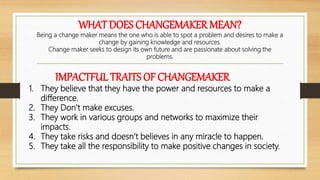Becoming a changemaker
- 1. BECOMING A CHANGE MAKER: INTRODUCTION TO SOCIAL INNOVATION NAME : YUVRAJ SHRIVASTAVA BRANCH : B.TECH{FIRE AND SAFETY} SAP ID : 500069508 REGISTRATION NO. : R260218058
- 2. WHAT DOES CHANGEMAKER MEAN? Being a change maker means the one who is able to spot a problem and desires to make a change by gaining knowledge and resources. Change maker seeks to design its own future and are passionate about solving the problems. IMPACTFUL TRAITS OF CHANGEMAKER 1. They believe that they have the power and resources to make a difference. 2. They DonĄŊt make excuses. 3. They work in various groups and networks to maximize their impacts. 4. They take risks and doesnĄŊt believes in any miracle to happen. 5. They take all the responsibility to make positive changes in society.
- 3. TYPEOFCHANGEMAKERS 1. INFLUENCERS: Their medium of change are thinking and decisions for eg. Motivational speakers, parents, etc... 2. INVENTORS: Their medium of change are tools and technology for eg. Scientists, engineers, etc.Ą 3. SKILL CATALYZERS: Their medium of change can be expert resources such as lawyers, mediators, etc.Ą 4. SOCIAL ARCHITECT: Their medium are social structures and resources for eg. Policy makers, designers. 5. INVESTORS: Their change medium are funding's resources for eg. Lic agents, investors, etc.Ą 6. CONNECTORS: Their medium of change are relationships for eg. Relationship advisers, lawyers, etc.Ą
- 4. Becoming the change Being the change Promoting the change witnessing the change TRANSFORMATION+VISION ROLE AS COMMUNITYMEMBER FAMILYMEMBER RESPONSIBLEMEMBER LIFELONGLEARNER
- 5. Ą° Ąą BE THE CHANGE YOU WANT TO SEE IN THE WORLD MAHATMA GANDHI THANK YOU




